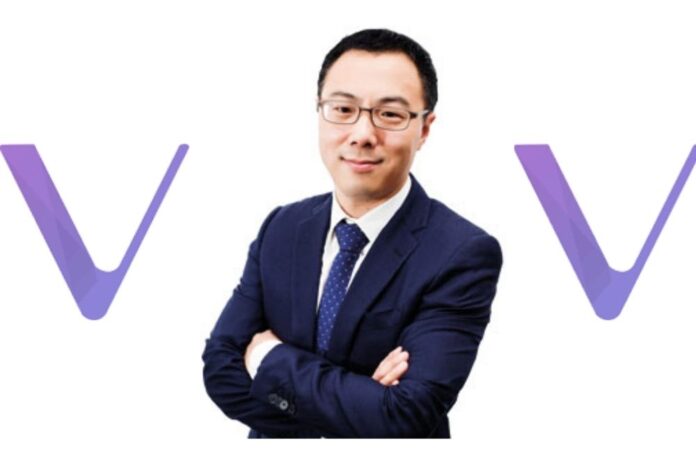Sunny Lu, the CEO of VeChain, the leading enterprise blockchain platform, was at the 2021 World’s Artificial Intelligence (AI) conference that was held a few days ago. There, he spoke extensively on the success of VeChain and how to help enterprises build a blockchain application quickly and effectively.
In the course of the presentation that lasted for about 7 minutes, Sunny Lu discussed the success of VeChain in conjunction with its viable partners, such as DNV and PwC.
Below is Sunny Lu’s speech as shared by VeChain Foundation a few hours ago:
Hello everyone, it’s great to be here again at the 2021 World Conference on Artificial Intelligence (AI). I attend every year and talk about blockchain every year. The development of blockchain is also particularly fast but I think that no matter how fast and chaotic the blockchain develops, ultimately, the industry has to return to its essence.
What is the essence? It is to transform the value of technology into the value of real economy. So today, I would like to share with you how to help enterprises build a blockchain application quickly and effectively.
So how do we do it? In fact, VeChain has made many attempts. After building about 70 to 80 enterprise-level applications, we have summarized our 3-layer-service model. I believe that each enterprise will find its own suitable one.
The so-called 3-layer-service model has a bottom layer, BaaS, blockchain as a service. It is difficult for most of the commercial enterprises except technology companies to build their own blockchain technology teams. Our BaaS platform allows enterprises to directly use public smart contracts, browsers, wallets, etc.
It can also help enterprises to customize the development of smart contracts and eventually deliver an API so that enterprises can use blockchain more quickly and do not need to entangle with blockchain-wise development. The middle layer is PaaS platform. It is our initiative attempt – low code blockchain PaaS.
We found that many enterprises will definitely generate new business scenarios or new business values in the process of using or trying to build blockchain applications and at the same time, you do not want to change the original business system too much while building new applications. This is a very common situation. That’s why we made such a PaaS platform for enterprises to make innovation on this platform.
PaaS is especially useful for multi-participant collaboration because all interactions happen on the blockchain PaaS and are developed in low code environment. This will greatly reduce costs and improve efficiency. The top player is SaaS.
DNV has talked about My Story, a digital product based on VeChain PaaS, which is a very interesting product that has greatly changed the TIC industry. My Story has greatly helped DNV’s global digitalization process during COVID-19.
Originally, wine certification in Europe was more expensive because experts needed to go to the customer’s site to conduct research, do audits, and form a report. But during the pandemic, experts could not travel so they could use this digital tool. On the one hand, experts can handle many customers at the same time.
On the other hand, it also greatly reduces the cost of digital verification or audit. For the customer, a digital certification product that may have cost hundreds of thousands of euros for an expert can now be reduced to as low as a few thousand or ten thousand euros.
The next step is to extend it through My Story, a digital product that records each link in the supply chain and takes out some of the special data to calculate the contribution of the product to sustainable development.
Recently, there is a hot topic, NFT, and we think that at the moment, NFT is more important to focus on use case. Recently, we have also used the PaaS platform to quickly develop a vaccine passport for the Republic of San Marino. It is the country of Italy with a 33,000 people, but in just a few days more than 31,000 passports have been issued, which covers a considerable majority of their citizens. It’s equivalent to an experiment that we have made with the national NFT application, which citizens can quickly use to achieve freedom of movement.
In the future, we hope to extend this technology to more European countries. Our PaaS platform enables rapid development iterations based on a low-code environment.
Another partner of ours, PwC, re-iterated a digital product based on PaaS. From the beginning to the delivery of this product, the total lead time is only three weeks. We only need to implement a UI and business logic on the front-end and the back-end can be directly implemented with the PaaS platform.
The last case, besides the big partners we talked about is a small startup, VeTrust. They have developed “Safety Code”, a digital management platform for public safety and public health, based on the low-code PaaS platform from VeChain. The development was amazingly fast. In the process of development, while (technology) is iterating, (platform) is connecting more application scenarios. But with the PaaS low-code environment, we can build templates quickly, maybe even one template a day.
I always believe more and more enterprises will embrace blockchain technology and more businesses will be running on blockchain. However, I believe that each enterprise has its own needs to achieve this quickly and efficiently. I hope this sharing can give you some inspiration and we can accelerate the implementation of blockchain applications together.


